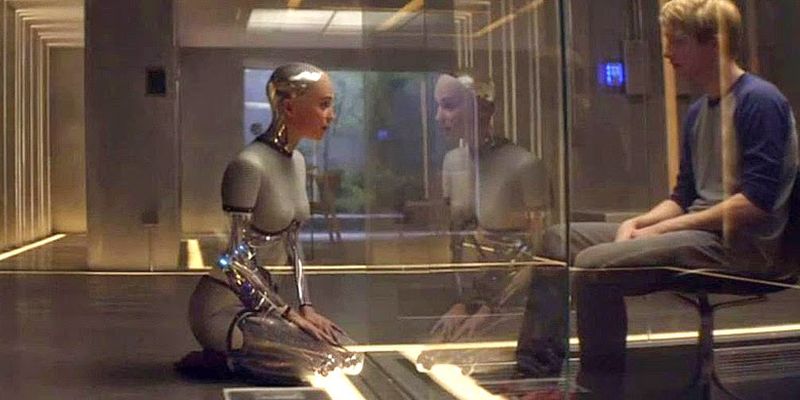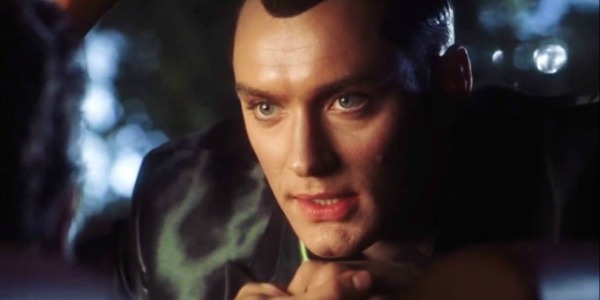Virtual Love: What Makes Us Fall For Artificial Intelligence?

Fresh out of grad school for clinical psych, you can…
Whether we like it or not, technology is becoming a larger part of our everyday lives, from the cell phones we carry to the laptops we work on. However, this trend has been ever-present in film, as long as science fiction has been on screen. Technological advances generally start as a method to improve human life but as soon as we design technology with a consciousness, that is when all hell breaks loose.
The typical moviegoer understands this trope far too well, with blockbusters like The Terminator or The Matrix. Man invents artificial intelligence, A.I. rebels against man, man then bows down to their robot overloads. As long as I can remember, this pattern has been basic movie 101. However, recently I’ve been seeing a different trend on the big screen. Instead of fighting these machines, what about developing relationships with them or even loving them?
I believe that these films pose important questions and offer great insight into the hypotheticals of the future. It’s known that the United Nations has debated on topics brought to the public’s attention by science fiction giants such as Star Trek and Battlestar Galactica, so perhaps we too should consider these topics. Should technological/human relationships exist and if so, to what degree?
Programmed For Two
Ever since my first viewing of Star Wars, I remember empathizing with R2D2. His beeps and whistles were unintelligible noises but I, like many others, projected my own feelings on to him. I cared when he was in danger and rejoiced when he overcame the odds, so it shouldn’t be too hard to understand how the x-wing fighter pilots were able to develop close relationships with their droids. However, when we start discussing “romantic” relationships, this is when the topic becomes a bit more taboo.

Recent films such as Her tell us something about our need for companionship while Ex Machina challenges our concept of beauty and sexuality. Yet their themes surround the concept of a human/A.I. romantic relationship, defined in today’s culture as a fetish: a form of sexual desire in which gratification is linked to a particular object, item of clothing, or part of the body.
So how do individuals develop this intense affection towards a machine? Psychology teaches us that it’s through the process of Classical Conditioning. This term was made famous by scientist Ivan Pavlov, in which he demonstrated that bodily reflexes (a dog salivating) could be associated with a neutral stimulus (the ringing of a bell). When this occurs, the biological reaction is then trained to demonstrate whenever the neutral stimulus is presented. In regards to a fetish, this can present when a bodily reaction (sexual arousal) is paired up with a neutral stimulus (like high heeled boots) so that eventually only the presentation of high heels will evoke sexual arousal.

Even though a romantic association can occur between a human and machine, it won’t stick without a strong reinforcement being present. The need to reproduce is an incredibly strong reinforcer for all animals, with humans being no exception. This is why the robots in films are designed to illustrate sexuality in their appearance. I think of the Fembots from Austin Powers or Gigolo Joe from A.I. Artificial Intelligence who were designed with the specific appearance to attract a particular person. With the individual’s perfect partner literally being manufactured for them, it’s easy to see how these machines meet the patron’s desires.
It’s all in the behavior
Along with appearance, attraction is in behavior. The way one moves, the way they think and act out their choices. This seamlessly trivial point is actually where A.I. becomes a far stronger reinforcement than pre-programmed robots. As A.I. learns, it tends to grow which is often reflected in the decisions it makes. Similar to a human being, they can often be unpredictable in how they develop. This unpredictability is what makes that attraction so strong between humans (just as It does for A.I.).
The fact that we cannot predict what will happen next often has us coming back for more with eager anticipation. Think of a slot machine at a casino: the unpredictability of a win keeps you hoping that your next pull will be “the one” and when you finally get a payout, you are further reinforced to come back for more. This is called an intermittent reinforcement schedule. Instead of predicting what will happen with a pre-programmed robot vacuum, A.I. tends to surprise us, which keeps us coming back for more, eagerly anticipating our next surprise.

Our brains are built to deal with our ancestor’s struggle for survival, days in which we were part of the food chain rather than high above it. With the sudden leaps in technology, our brains have not had the time to evolve when it comes to making specific distinctions, which in turn leads to generalization. The feelings we get from talking to a computer screen are often very similar to that of being in front of a living person since our brains often are unable to distinguish the difference on a chemical level. The neurotransmitters we produce that are associated with love and belonging spill over to associate with these new stimuli in our lives, which in turn creates another association with our need for technology. Everything comes back to classical conditioning.
What’s in the future?
So why isn’t everyone on team A.I.? Much is unknown about artificial intelligence and the media often portrays it as the determinant for an apocalyptic future. However, some advocates for A.I. relationships state that it could be therapeutic in helping those with social anxiety overcome their symptoms. It could also help those who have gone through a bad break up recover enough to establish a healthy relationship (similar to Ryan Gosling’s character in Lars and the Real Girl).
While the true nature of A.I. relationships will be a mystery until their development, we can always turn to science fiction to contemplate its place in our world. Rather than just the classic tropes of robot wars, it’s kind of entertaining to debate a different perspective on man’s relationship with machines. However the turn out, we can always learn from a different perspective.
How do you feel about relationships with A.I.?
Does content like this matter to you?
Become a Member and support film journalism. Unlock access to all of Film Inquiry`s great articles. Join a community of like-minded readers who are passionate about cinema - get access to our private members Network, give back to independent filmmakers, and more.
Fresh out of grad school for clinical psych, you can find Russell at any local market place next to the vendors that sell pairs of socks, as he nit-picks the psychology within movies. He enjoys long walks on the beach, candle light dinners, and systematically analyzing the first two in order to draw trivial correlations. But hey, who said science can't be sexy?













